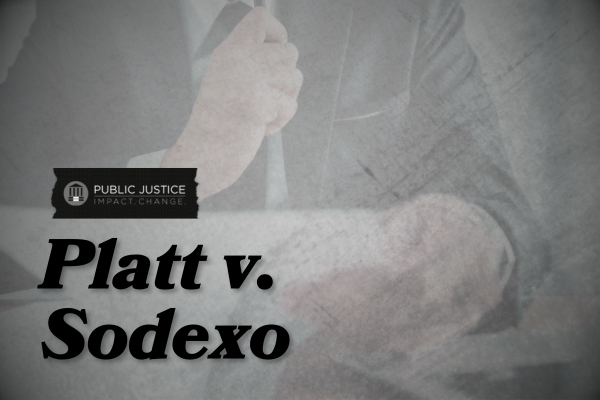
After 50 Years, ERISA Still Works. Platt v. Sodexo Shows Us Why.
By Tabitha Woodruff, Access to Justice Strategic Outreach Attorney
Two societal values so intrinsic to humanity as to make them nearly universal across cultures are these: we care for our sick and we protect our elderly. The ways human societies bring these two values to life around the globe and throughout human history differ greatly, but they have proven to be central to morality and civility. We are collectively responsible for protecting and providing for people who are sick or elderly; we have a duty to hold ourselves to the highest standards in this regard. In the legal realm, one illustration of both values can be found in the legislative history of a federal bill that was over a decade in the making: the Employee Retirement Income Security Act of 1974 (ERISA).
In July 1971, Lester Fox of South Bend, Indiana traveled to Washington, D.C. to testify in the U.S. Senate about the shocking loss of his pension plan after twenty loyal years working for Studebaker. In 1963, the century-old beloved automobile company suddenly shut down the Studebaker automobile plant in their hometown of South Bend, Indiana, leaving over seven thousand people unemployed. The people of South Bend were shocked by the shutdown because they trusted Studebaker, and many people worked there alongside their parents and grandparents. Mr. Fox explained to the Subcommittee on Labor of the Committee on Labor and Public Welfare, “…in excess of 4,000 workers who had a promise of a private pension plan witnessed it vanishing before their very eyes. That was a decision made by the employer. The employees had absolutely no voice in the decision to terminate the operation. This was purely a management decision.” Mr. Fox later told reporters for the Washington Post, “At least I was 40 years old at the time. I still had plenty of time to make some more money.” Others were not so lucky. Some, so devastated by the loss of their pension just a couple years before retirement, committed suicide.
Eleven years after Studebaker’s shutdown of the South Bend plant, Congress finally passed ERISA into law in 1974. ERISA created strict rules around pension plans and a structure for insuring them. Today, ERISA covers many of the employer-sponsored benefits that workers rely on most, including pension plans, 401(k) plans, and health and disability insurance plans. Among other things, ERISA requires that plans be overseen by fiduciaries who must act in the best interest of the plan. ERISA imposes duties on the plan fiduciaries and provides specific mechanisms for participants of plans to hold those fiduciaries accountable. Section 502 of ERISA , entitled “civil enforcement” spells out how “a civil action may be brought.” Section 502 permits plan participants and beneficiaries to bring claims under § 409, which makes plan fiduciaries personally liable to the plan as a whole and provides for plan-wide relief. Together, these sections empower plan participants to bring “representative actions” of behalf of the plan for plan-wide relief—not to be confused with the better known “class action” mechanism. An ERISA representative action for plan-wide relief is exactly the relief sought by plaintiff Robert Platt in Platt v. Sodexo pending in the 9th Circuit.
In this case, Mr. Platt filed a representative action under ERISA against his employer Sodexo to hold fiduciaries accountable for unfair surcharges to the health insurance plan and to ask the court to order the fiduciaries to provide a reasonable alternative standard to allow plan participants to avoid the surcharge. But Sodexo wants to force Mr. Platt’s representative claims for plan-wide relief into individual arbitration—a procedure inherently at odds with ERISA’s provision for plan-wide adjudication.
The U.S. Supreme Court’s decision in LaRue v. DeWolff, Boberg & Assocs., Inc., notes that “§ 502(a)(2) does not provide a remedy for individual injuries distinct from plan injuries” and that participants of a defined contribution plan can bring actions for both individual injuries and plan injuries under this provision. Unfortunately, an unpublished 2019 decision in the 9th Circuit has muddied otherwise clear case law by suggesting that claims “brought in the context of a defined contribution plan” are “inherently individualized,” and can be compelled into individual arbitration. The district court in Mr. Platt’s case took it a step further down the wrong path by holding that Mr. Platt could be compelled into individual arbitration even though his case does not involve a defined contribution plan and even though he is seeking plan-wide relief.
On February 29, 2024, Public Justice filed an amicus brief in the 9th Circuit in Mr. Platt’s case to urge the court to remain in line with the U.S. Supreme Court and with the other six federal circuit courts of appeal to have considered this question. ERISA gives workers specific federal rights in statute that allow them to stand up for themselves and their co-workers in court when their healthcare and retirement plans are unfair. In our amicus brief, we argue that it is vital that we preserve these federal rights and prevent fiduciaries of these ERISA covered plans from blocking worker access to the courts by compelling them into individual arbitration.
If we hold ourselves to the standards of morality and civility intrinsic to human society, to care for our sick and to protect our elderly, we will maintain the access to justice provisions of ERISA as they were enacted. Public Justice will keep fighting to make sure the law is clear and the courts speak in unison to maintain access to the courts.


